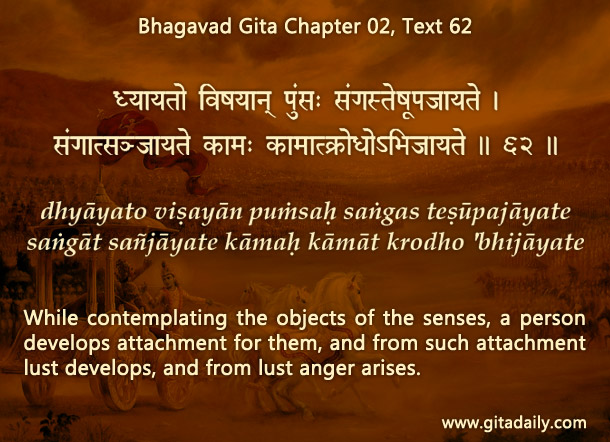To get into a desire is far more difficult than getting out of a desire. Better to exercise our intelligence to decide whether to get in, than to exercise it much more to decide how to get out. Our life is shaped by our choices and not just the big choices that we make in terms of deciding life partner or deciding our career pathway, but also in terms of the small choices that we make in terms of such desires we decide to pursue, when they pop up in our inner world.
To get into a desire is very easy just as, clicking a notification to watch some new video that has been uploaded on some entertainment channel is easy. However, once we start watching that video and then we start watching another video and yet another video till we have wasted hours on stuff that has long stopped being entertaining and has soon become not just boring but even frustratingly boring and even needlessly agitating. We all know how difficult it is to pull ourselves away from our phone screens when we are caught in watching something.
It’s even more difficult to pull ourselves away internally from the desires in which we have got caught. Why more difficult? Primarily because, the whole process of inner entanglement is invisible and may not produce any tangible troubles for quite some time. For example, if we sit down for a meditation session and we let ourselves get caught in some desire then for the entire duration of our meditation, we might be hallucinating or fantasizing about some irrelevant desire without even realizing that we have been so consumed by it.
While watching one video after another we need to at least click or scroll or do some physical action with at least our fingers but, when we are mentally caught, we don’t need to do anything at all. We just passively watch on while we are being aggressively consumed by our distraction or infatuation with that object. To prevent ourselves from being caught we need to have our intelligence active, alert and adept.
It is far easier if the intelligence is active in advance in terms of preventing our getting involved with random desires, just as it is far easier and safer to pull ourselves back from the edge of a slippery slope. Once we get down on that slippery slope and start slipping downwards, it requires far greater effort and it entails far greater injury to pull ourselves off from the process of sliding downwards as we are pulled down by gravity. Similarly, the more we get engaged with our desires, beginning with contemplating on them as the Bhagavad Gita warns in (2.62), the more we will find it difficult to get ourselves off the slippery slope and the more we will be damaged in the process.
A morsel of attention can save us from a mouthful of agitation.
Summary:
- Just as we may get caught in watching random videos based on notifications that pop up on our screen, we may get caught in pursuing desires that pop up in our inner world.
- Because the inner entanglement is largely invisible till it takes some tangible physical toll in terms of something observable or measurable.
- The inner obsession with desires can be more distracting and damaging than outer obsession with social media posts, just as it requires much lesser effort, just as it is easier and safer to pull ourselves back from the edge before we step on a slippery slope, it’s far easier and safer if our intelligence is active, alert and adept to stop us from engaging with random desires.
Think it over:
- How is our inner world like a phone screen? How is it actually more dangerous than a phone screen?
- Note one incident when you got caught on a slippery slope and ended up paying an unnecessary and heavy price for the inner obsession.
- List three points using your intelligence that can remind you to pull yourself away whenever you come close to the slippery slope of getting caught in random inner desires.
02.62 While contemplating the objects of the senses, a person develops attachment for them, and from such attachment lust develops, and from lust anger arises.


Leave A Comment